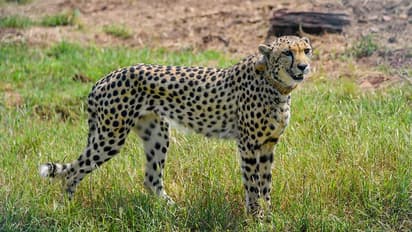Cheetahs' 1st moments on Indian soil: From entry to 360-degree scan of new environment - here's what happened

Synopsis
After spending a month in the quarantine enclosure, the eight cheetahs -- five female, three male -- will be shifted to an acclimatization enclosure within the Kuno National Park.
As the door of its cage slid open, the first of the eight cheetahs brought to Madhya Pradesh's Kuno National Park hesitated for a moment or two before stepping out onto the grass.
It then ran, came to a halt near a tree and scanned the surroundings, its new home 8000 km away from its native Namibia, by turning the neck in every direction.
The moments were captured by TV cameras and Prime Minister Narendra Modi, who clicked pictures with his DSLR camera from the high dais above the cage where the cheetah had emerged into a special quarantine enclosure.
At around 11.30 am, Modi operated a lever to release three of eight cheetahs brought to India from Namibia as part of a project to revive the animal population that became extinct in India in 1952.
After spending a month in the quarantine enclosure, the eight cheetahs -- five female, three male -- will be shifted to an acclimatization enclosure within the national park, where they will stay for up to four months before being released into the wild.
In his speech after releasing cheetahs, PM Modi cautioned that they need time to get used to their new surroundings before people can see them in the wild.
"Cheetahs are our guests; we should give them a few months to make Kuno National Park their home," he said.
The KNP, spread over 700 sq km, is situated on the northern side of Vindhyachal mountains. It derives its name from the Kuno river, a tributary of the Chambal.
While the 'African Cheetah Introduction Project in India' was conceived in 2009, the plan to bring the big cat to the KNP by November last year suffered a setback due to the COVID-19 pandemic.
Also read: Cheetahs return to India: Here's when the feline will prowl freely in the jungles
"Project Cheetah, under which the cheetahs were reintroduced in the country after they became extinct seven decades ago, is our endeavour towards environment and wildlife conservation. Cheetahs are our guests; we should give them a few months to make Kuno National Park their home," Modi said.
He asked people to wait for some time to give time to cheetahs to make their territory in KNP.
"It is right that when nature and environment are conserved, our future becomes secure. It also opens up vistas for development and progress," the prime minister said.
India is trying to revive the population of cheetahs as per international guidelines and there is a need to ensure that these efforts do not go in vain, he added.
"Cheetahs will sprint again in KNP and will restore grassland ecosystems and bolster biodiversity...Nature and environment, animals and birds are not just the subject of sustainability and security for India, but they are also the basis of our sensibility and spirituality," he said.
He also noted that in the past, the target of doubling the tiger population in the country was achieved before time and the numbers of single-horn rhinos who were under threat have now shot up.
"The count of elephants too has crossed the 30,000-mark. The number of Asiatic lions has risen sharply. Gujarat has emerged as a big centre of lions in the county following the hard work, research-based policies and massive public participation of the last few decades, Modi added.
The prime minister said that India is sending out a message to the world that economy and ecology are not opposites of each other, and has shown that a country can progress by protecting the environment.
Earlier, the modified Boeing 747 carrying eight cheetahs landed at the Gwalior airbase at 7.47 am. It was operated by Terra Avia, an airline based at Chisinau, Moldova in Europe.
The animals were then flown by two Air Force helicopters to Palpur near the Park, 165 km away. The journey took around 25 minutes. The Boeing 747 had carried the cheetahs in special wooden crates during the 10-hour journey.
Before the flight, the animals were treated with a tranquillizer drug. The cheetahs remained without food during the transcontinental journey.
Sources said that two of the cheetahs imported from Namibia are siblings (brothers), while one malnourished female guest was nursed back to health by a farmer in the African nation.
Also read: PM Modi's cheetah release 'tamasha' orchestrated to avoid national issues: Congress
(With inputs from PTI)
Stay updated with the Breaking News Today and Latest News from across India and around the world. Get real-time updates, in-depth analysis, and comprehensive coverage of India News, World News, Indian Defence News, Kerala News, and Karnataka News. From politics to current affairs, follow every major story as it unfolds. Get real-time updates from IMD on major cities weather forecasts, including Rain alerts, Cyclone warnings, and temperature trends. Download the Asianet News Official App from the Android Play Store and iPhone App Store for accurate and timely news updates anytime, anywhere.